Groundbreaking Mathematical Model Sheds Light on Bone Remodeling
 In a significant academic achievement, the Department of Mathematics is proud to announce that Dr Koyel Chakravarty, an Assistant Professor, along with her diligent PhD Scholar, Ms Amrutha Sreekumar, has made a remarkable contribution to the field of biological mathematics. Their paper, titled “Exploring the Impact of PTH Therapy on Bone Remodeling: A Mathematical Investigation,” has been officially accepted for publication in the prestigious Journal of Biological Systems by World Scientific.
In a significant academic achievement, the Department of Mathematics is proud to announce that Dr Koyel Chakravarty, an Assistant Professor, along with her diligent PhD Scholar, Ms Amrutha Sreekumar, has made a remarkable contribution to the field of biological mathematics. Their paper, titled “Exploring the Impact of PTH Therapy on Bone Remodeling: A Mathematical Investigation,” has been officially accepted for publication in the prestigious Journal of Biological Systems by World Scientific.
This paper presents a comprehensive mathematical model that investigates the effects of Parathyroid Hormone (PTH) therapy on bone remodelling processes. The research provides valuable insights that could potentially lead to more effective treatments for bone-related diseases and conditions.
The university community extends its heartfelt congratulations to Dr Chakravarty and Ms Sreekumar for their dedication and hard work.
Abstract
The regulatory role of parathyroid hormone (PTH) on bone, a crucial calcium reservoir, is influenced by sex steroids, notably estrogen. A mathematical model elucidates PTH-mediated bone remodeling mechanisms, examining plasma PTH effects and external dosages. Daily PTH injections, with their dual anabolic or catabolic action, offer a notable treatment for severe osteoporosis. This study predicts osteogenic responses to PTH, integrating factors like TGF-β, RANKL, and bisphosphonates in osteoblast-osteoclast signaling, alongside PTH’s effects on glands and regulatory molecules like Runx2, pCREB, and Bcl2. Using various methods, including simulations and sensitivity analysis, it aims to understand PTH therapy’s impact on bone volume, enhancing its clinical relevance.
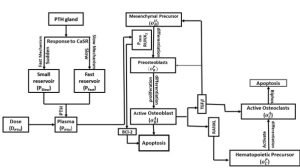
Explanation of the Research in Layperson’s Terms
The role of parathyroid hormone (PTH) in calcium storage within bones is significant, with its regulation influenced by other hormones, notably estrogen. A mathematical model has been developed to comprehend the effects of PTH on bones, examining both endogenous levels in the blood and exogenous intake requirements. It has been observed that daily PTH injections can be beneficial in treating severe bone conditions like osteoporosis, as these injections can induce either bone formation or resorption, depending on their administration method. Additionally, the response of bones to PTH is under scrutiny in this study, considering various substances such as TGF-β, RANKL, and bisphosphonates, and their interplay in maintaining bone health. Through the utilization of different methodologies including computer simulations, efforts are being made to precisely understand how PTH injections influence bone health, thereby enhancing their efficacy in addressing bone-related ailments.
Title of the Research paper in the Citation Format
Exploring the Impact of PTH Therapy on Bone Remodeling: A Mathematical Investigation
Practical Implementation or the Social Implications Associated
Personalized Treatment Plans:
Mathematical modeling of bone remodeling can facilitate the development of personalized treatment plans for individuals with bone disorders such as osteoporosis. By considering factors like hormone levels, genetic predispositions, and lifestyle factors, healthcare providers can tailor treatment strategies to optimize bone health outcomes.
1. Drug Development:
Insights gained from mathematical models can aid in the development of new drugs for bone disorders. By simulating the effects of potential therapeutic agents on bone remodeling processes, researchers can identify promising candidates for further investigation, potentially accelerating the drug discovery process.
2. Improved Clinical Decision Making:
Healthcare professionals can use mathematical models to make more informed clinical decisions regarding the management of bone disorders. By integrating patient-specific data into predictive models, clinicians can better predict treatment outcomes and adjust therapeutic interventions accordingly.
3. Enhanced Surgical Planning:
Mathematical modeling can also be valuable in surgical planning for procedures such as bone grafting or joint replacement. By simulating the effects of surgical interventions on bone remodeling, surgeons can optimize surgical techniques to promote more effective healing and long-term outcomes for patients.
4. Public Health Interventions:
Understanding the factors influencing bone remodeling at a population level can inform public health interventions aimed at reducing the burden of bone disorders. By identifying modifiable risk factors and developing targeted prevention strategies, policymakers can promote bone health and reduce the incidence of conditions like osteoporosis on a larger scale.
5. Educational Tools:
Mathematical models of bone remodeling can serve as educational tools for healthcare professionals, students, and patients. By visualizing complex biological processes in a simplified manner, these models can enhance understanding of bone physiology and the mechanisms underlying bone disorders, ultimately improving patient care and outcomes.
Collaborators:
• Prof. D.C. Dalal, Professor, Department of Mathematics, IIT Guwahati
• Dr. L.N. Guin, Associate Professor, Department of Mathematics, Visva-Bharati
Future research plans.
a) Incorporating Multi-Scale Modeling: Future research could focus on integrating multi-scale modeling approaches to capture the intricate interactions occurring at different levels of bone structure, from the molecular to the tissue level. By incorporating information on cellular processes, tissue mechanics, and systemic factors, these models could provide a more comprehensive understanding of bone remodeling dynamics.
b) Accounting for Heterogeneity: There is a need to develop mathematical models that account for the heterogeneity observed in bone remodeling processes across individuals and within different anatomical sites. By considering factors such as age, sex, genetics, and bone quality, researchers can create more personalized and accurate models to predict individual responses to treatment and disease progression.
c) Integration of Advanced Imaging Techniques: Advances in imaging technologies such as micro-computed tomography (micro-CT) and magnetic resonance imaging (MRI) provide detailed insights into bone structure and function. Future research could focus on integrating data from these advanced imaging techniques into mathematical models to enhance their predictive capabilities and enable non-invasive monitoring of bone remodeling in clinical settings.
d) Exploring Therapeutic Interventions: Researchers could use mathematical modeling to explore the efficacy of novel therapeutic interventions for bone disorders, such as drug treatments, exercise regimens, and dietary interventions. By simulating the effects of these interventions on bone remodeling processes, researchers can identify optimal treatment strategies and accelerate the development of new therapies.
Link to the article
- Published in Departmental News, Events, Math News, Research News
Exploring Railway Bridges and Track Structure: Insights from Industry Professionals
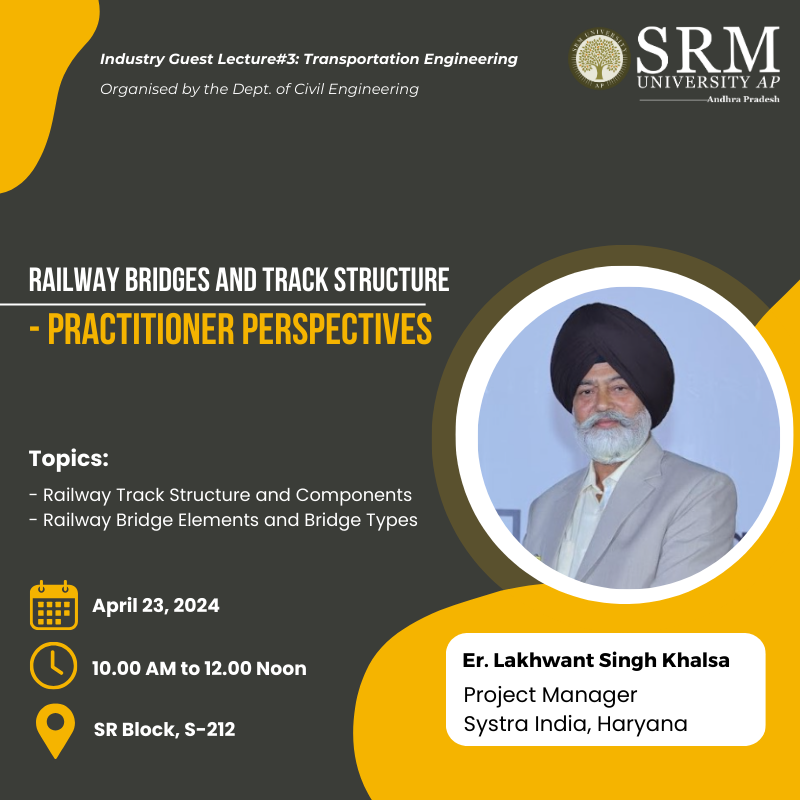
The Department of Civil Engineering is thrilled to host Er. Lakhwant Singh Khalsa for its 3rd Industry Guest Lecture Series. Mr Khalsa, Project Manager at Systra India, Haryana, will deliberate on “Railway Bridges and Track Structure – Practitioner Perspectives”. His lecture will offer deep insights into Railway Track Structure and Components and Railway Bridge Elements and Bridge Types. We Invite all civil engineering students and enthusiasts to join the insightful session on April 23, 2024.
About the Speaker:
Er. Lakhwant Singh Khalsa currently working as a project manager, Systra/PMC for RVNL Vijayawada 3rd line rail project. He has 41 years of rich & extensive experience in railway steel bridge structures, civil bridge works and project management. He is a Life Member of the Institution of Permanent Way Engineers (India)-IPWE and the Indian Institution of Bridge Engineers-IIBE. He holds several prestigious certifications, such as welding inspector from the welding research institute BHEL Trichy and Level II Certification in Non-Destructing Testing for DPT, MPT & UT as per SNT TC IA2006. He is familiar with IS, IRS, EN, and BS Codes, which are relevant to steel and concrete works. Also, he has experience working in hilly terrains in the Himalayan Ranges with critical environmental conditions.
- Published in Civil Engg events, Departmental Events, Events
Stanford University Professor Highlights Liberal Arts Education in India
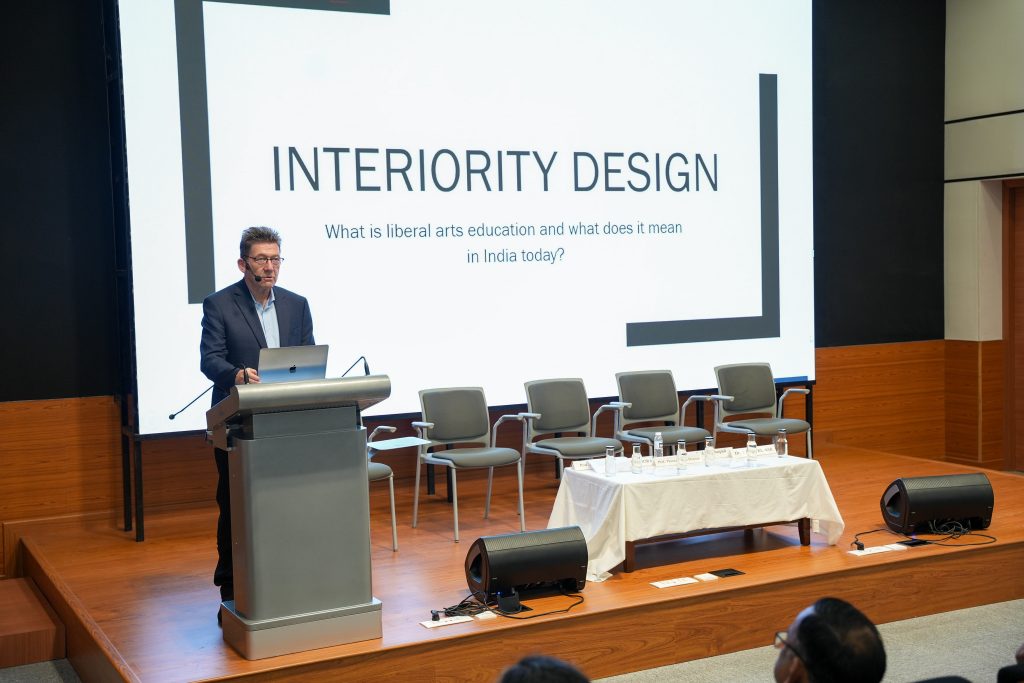
SRM University-AP convened the 18th chapter of its esteemed University Distinguished Lecture (UDL) series under the auspices of the Easwari School of Liberal Arts. This enlightening session showcased the expertise of Prof. Thomas Blom Hansen, the Reliance-Dhirubhai Ambani Professor & Department Chair, Department of Anthropology School of Humanities and Sciences Stanford University, USA. The lecture delved into the topic of “Interiority Design: Liberal Arts Education in India,” providing insights into the evolving landscape of liberal arts education within the Indian context.
Manoj K Arora stated, “We are a university that provides unique learning experiences; this UDL is part of that learning.” His insightful address underscored the significance of liberal arts and interdisciplinary learning.
During the lecture, Prof. Thomas Blom Hansen remarked on the need for liberal arts education in India to shape well-rounded individuals capable of addressing multifaceted challenges and embracing diverse perspectives. Prof. Hansen’s remarks emphasised the relevance and transformative potential of liberal arts education, enabling students to introspect and cultivate a deeper understanding of the world around them.
The 18th chapter of the University Distinguished Lecture (UDL) concluded with an interactive Q&A session. A token of appreciation was presented to Thomas Blom Hansen by Prof. Vishnupad, Dean-Easwari School of Liberal Arts, along with Prof. Ranjit Thapa, Dean-Research; Prof. G S Vinod Kumar, Professor and Head, Department of Mechanical Engineering; Dr Ayesha Parveen Haroon, Head and Assistant Professor, Department of Psychology; Dr J P Raja Pandiyan, Assistant Professor-Department of Chemistry. The event also saw the presence of Registrar Dr R Premkumar, Prof. Jayaseelan Murugaiyan and Prof. Vandana Swami, among others.
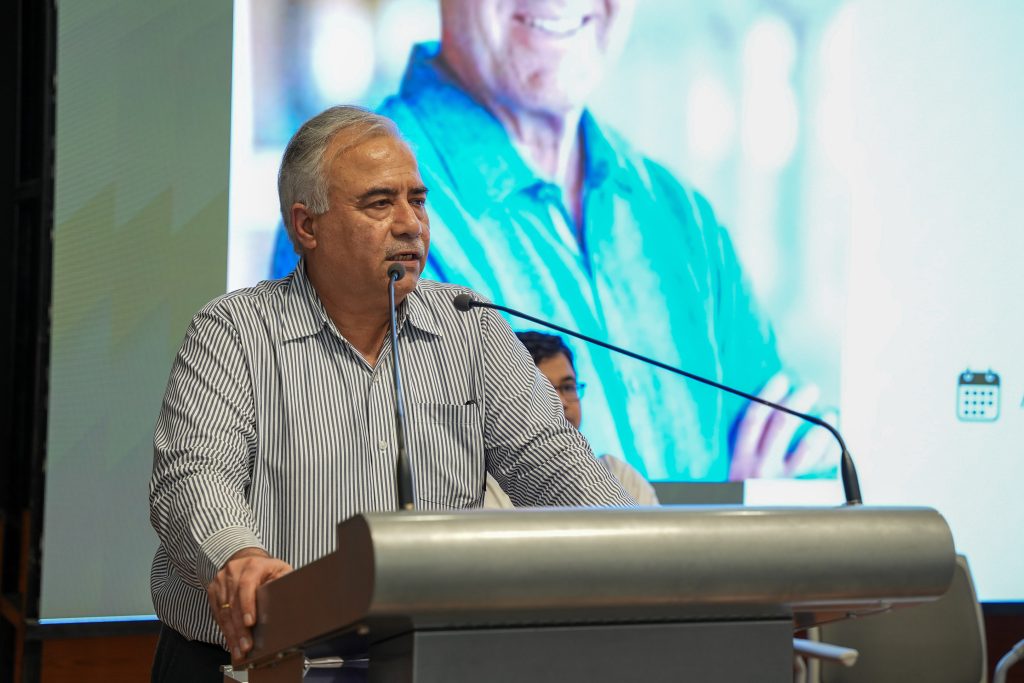
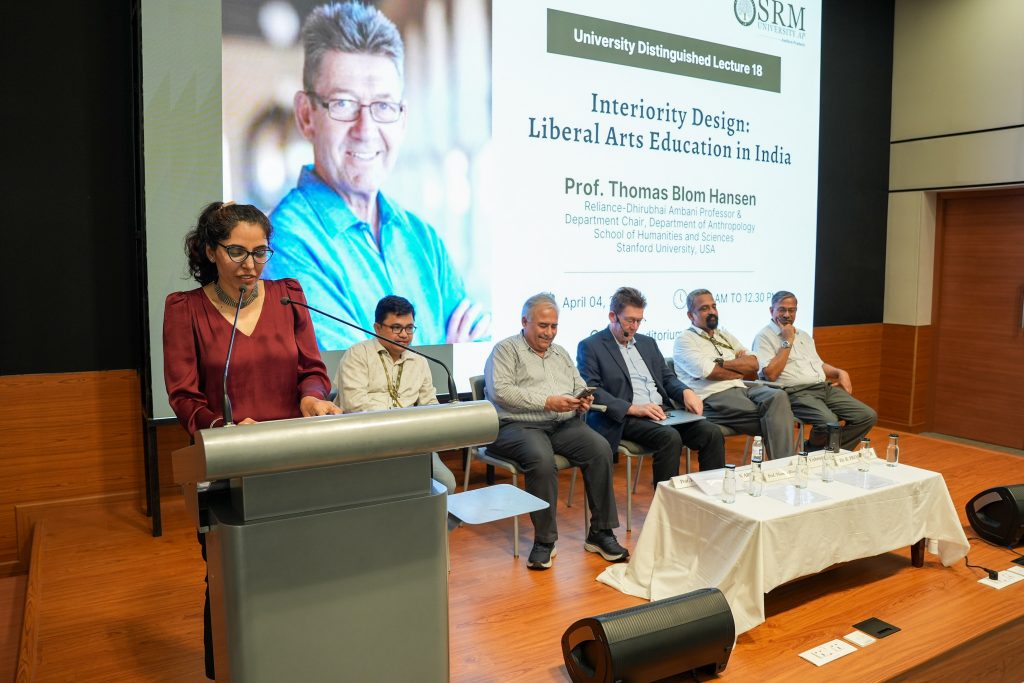
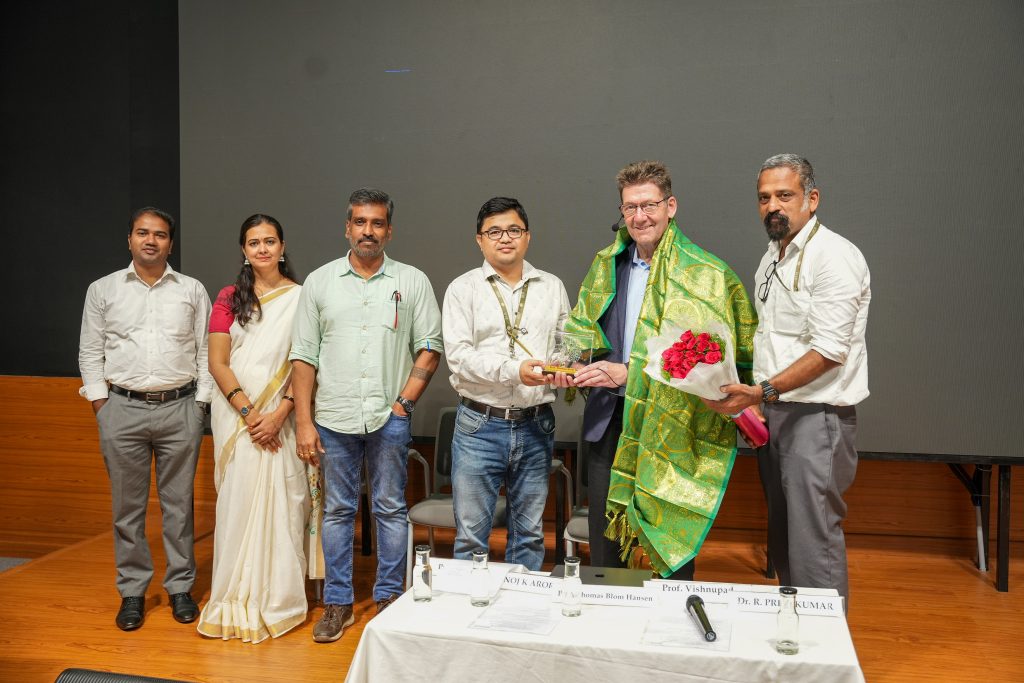
- Published in Departmental News, News, University Distinguished Lecture
Igniting Entrepreneurial Sparks: Varsity Hosts Entrepreneurship Bootcamp 1.0 for Young Innovators
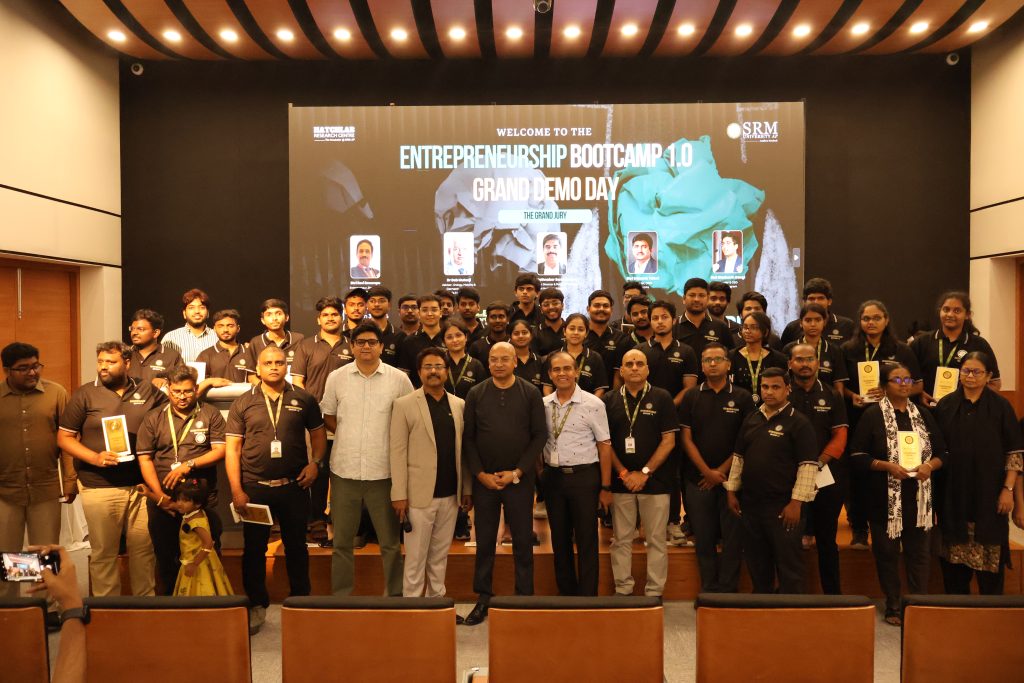
The Entrepreneurship Bootcamp 1.0 Demo Day, hosted by the Directorate of Entrepreneurship and Innovation at SRM University-AP on March 31, 2024, marked a fitting culmination of rigorous entrepreneurship training for aspiring student and faculty entrepreneurs. Dynamic pitches were presented by participants through the demonstration of their innovative ideas, astute business models and go-to-market strategies, complemented by sharp & insightful feedback from global investors and world-class mentors. The elite panel of industry mentors included Srikanth Talluri, Founder and CMD of 6D.Works, Rathnakar Samavedam, Investment Director & CEO Hyderabad Angels, Deb Mukherji, Chief Advisor-Anglian Omega Group – India, Siddharth Dangi, Founder & CEO at Mentogram, Singapore, Ravi Eswarapu, President of TIE, CXO turned Entrepreneur and Dr Dhiraj K Mahajan, Associate Professor, Department of Mechanical Engineering, IIT Ropar along with Prof. Manoj K Arora, Vice Chancellor of SRM AP.
The Entrepreneurship Boot Camp 1.0 at SRM AP was a comprehensive 6-week cohort featuring 8 interactive sessions carefully curated for a dedicated pool of 60+ selected participants, who immersed themselves in an intensive boot camp guided by Prof. Sidharth Tripathy, a Harvard Alumnus and a Director of Entrepreneurship and Innovation at SRM AP.
Participants navigated the intricacies of ideation, business development, and strategic planning as the curriculum featured world-class case studies, practical implementation roadmaps, and real-time engagements with industry and business mentors of international calibre. From a competitive pool of 180 applicants, a rigorous selection process resulted in the acceptance of only 60 candidates. Further refinement led to the identification of 16 standout ventures. Ultimately, a select group of 10 ventures was chosen to receive a grant of Rs 50,000 each, thereby empowering them to incubate, accelerate, and build their ventures in Hatch Lab Research Centre, the incubator of SRM AP.
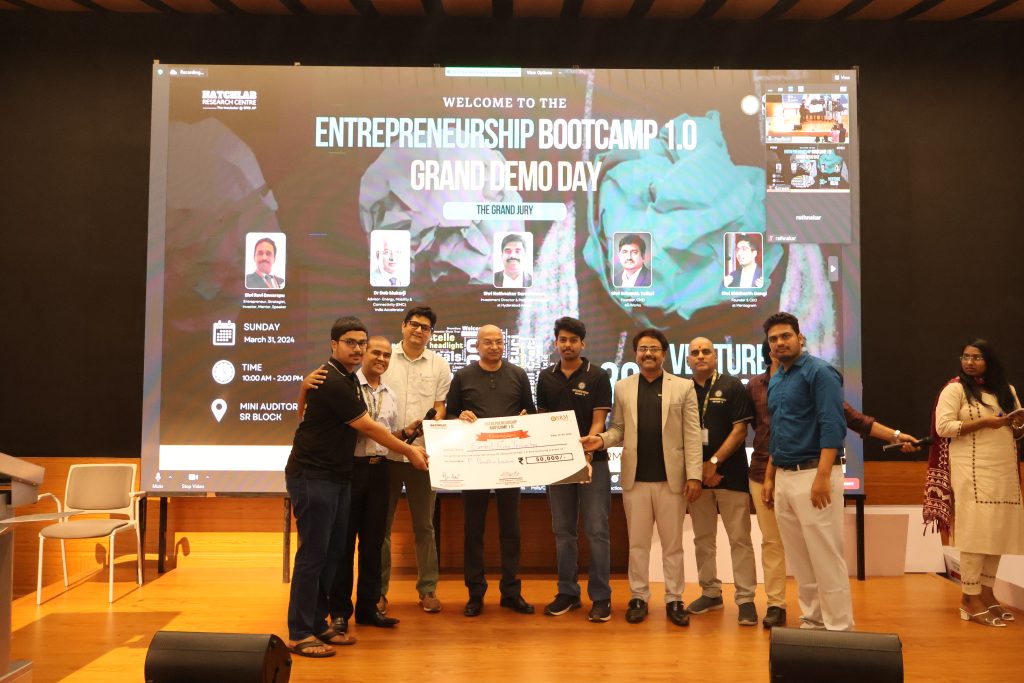
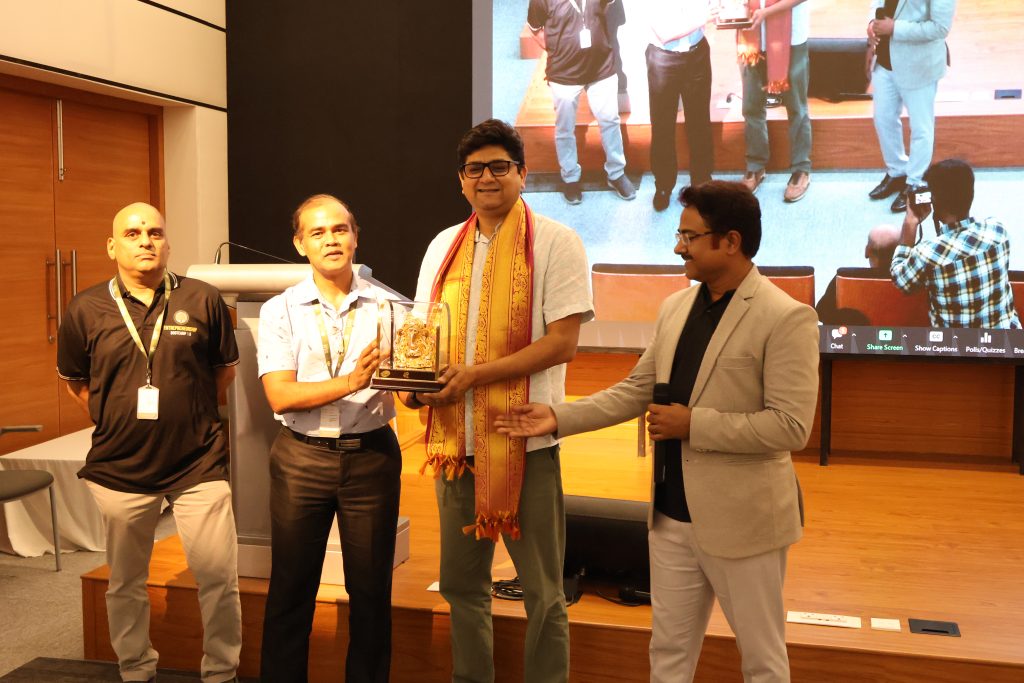
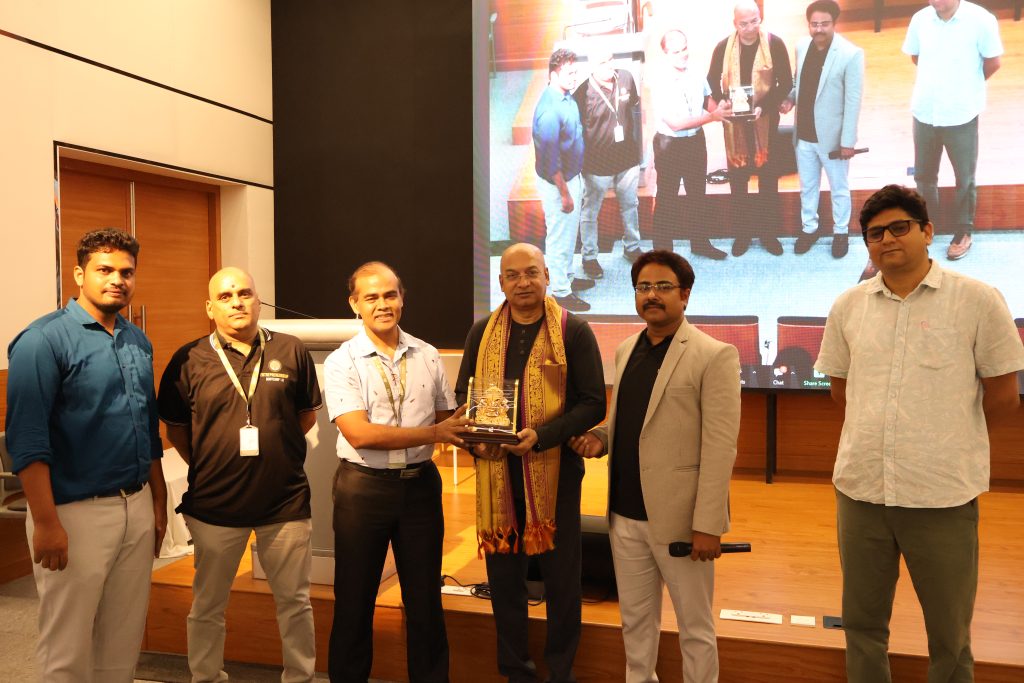
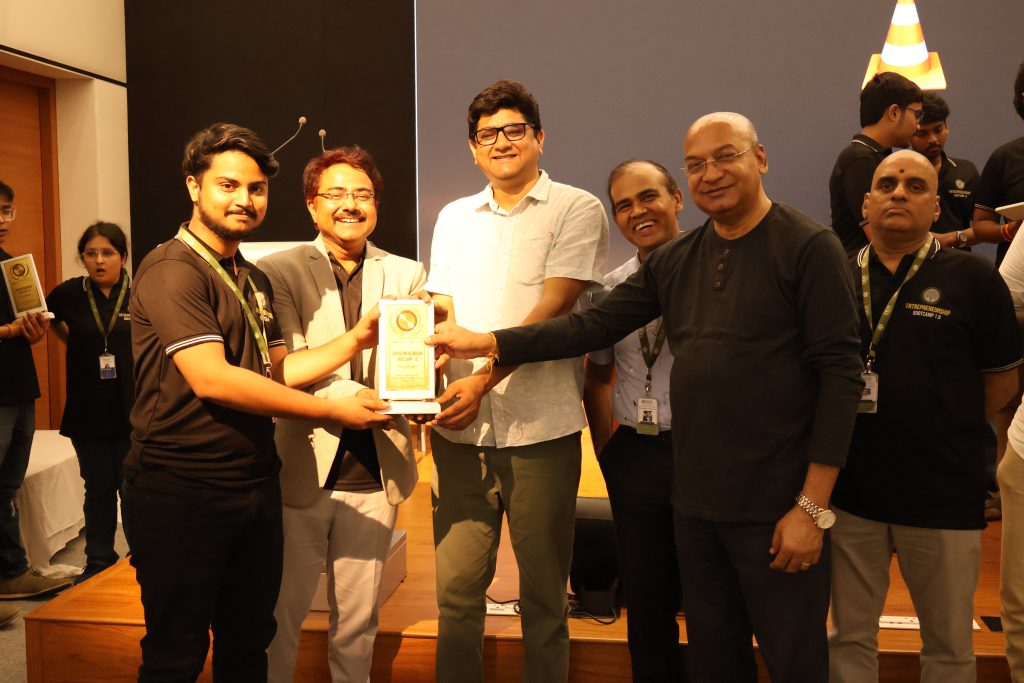
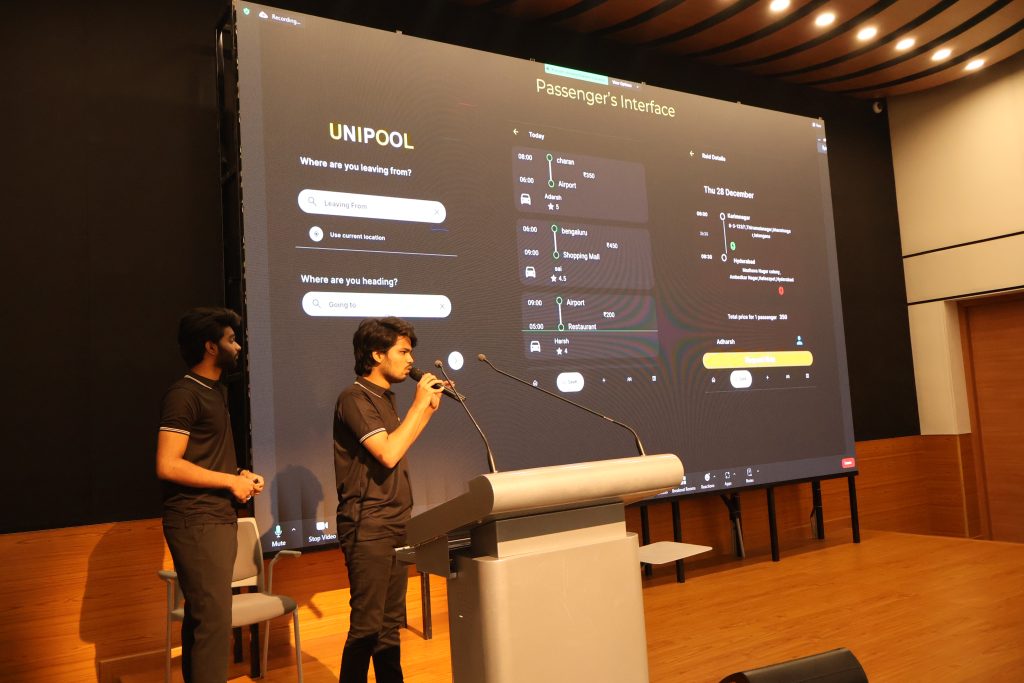
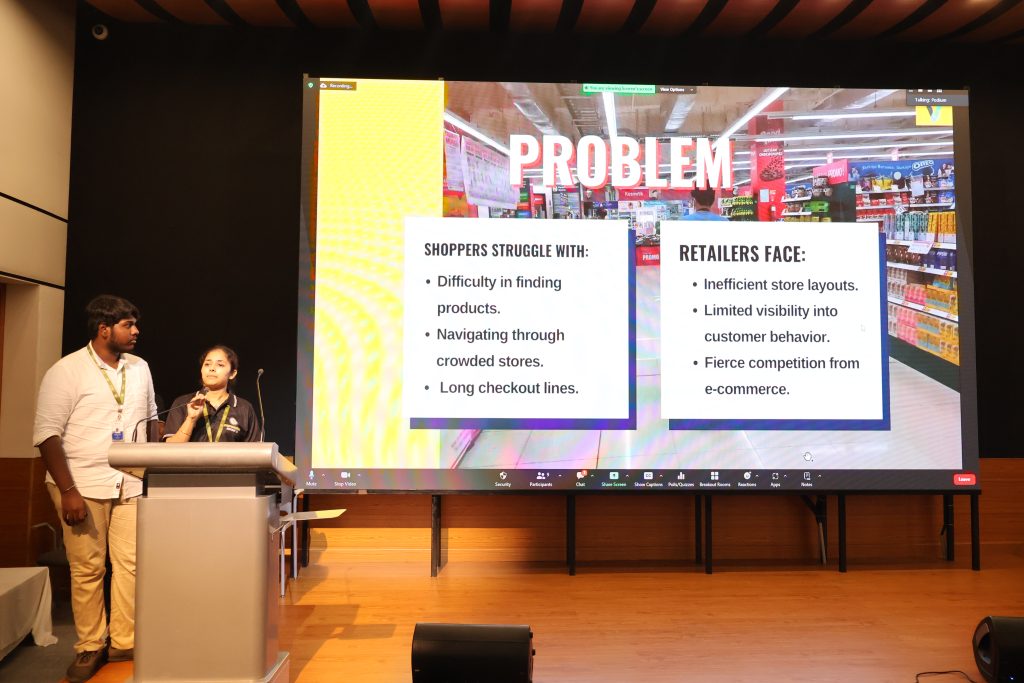
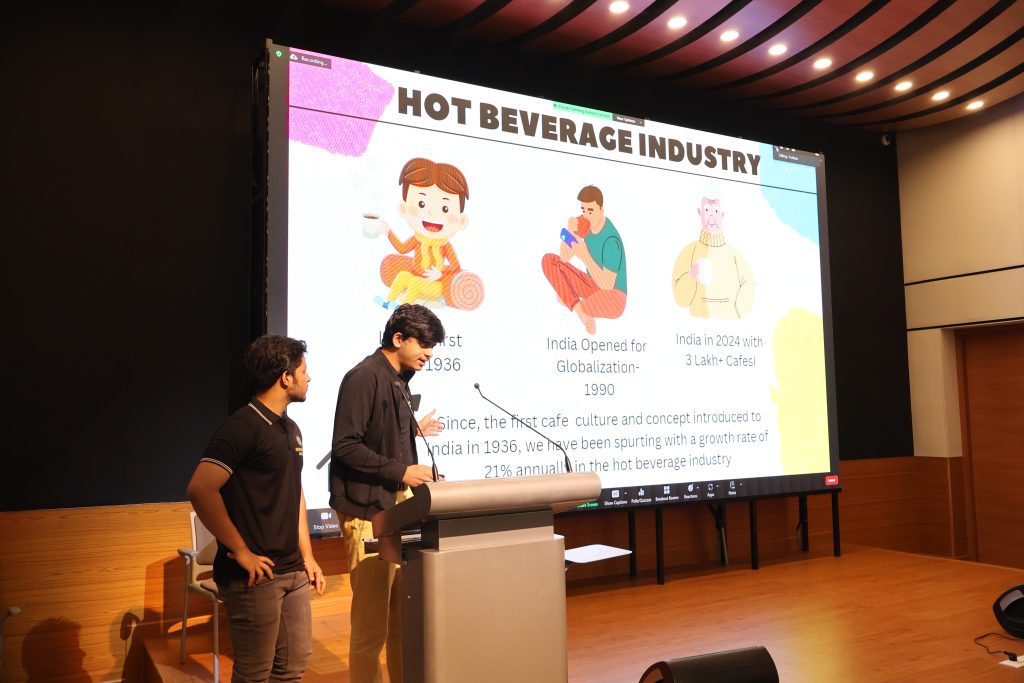
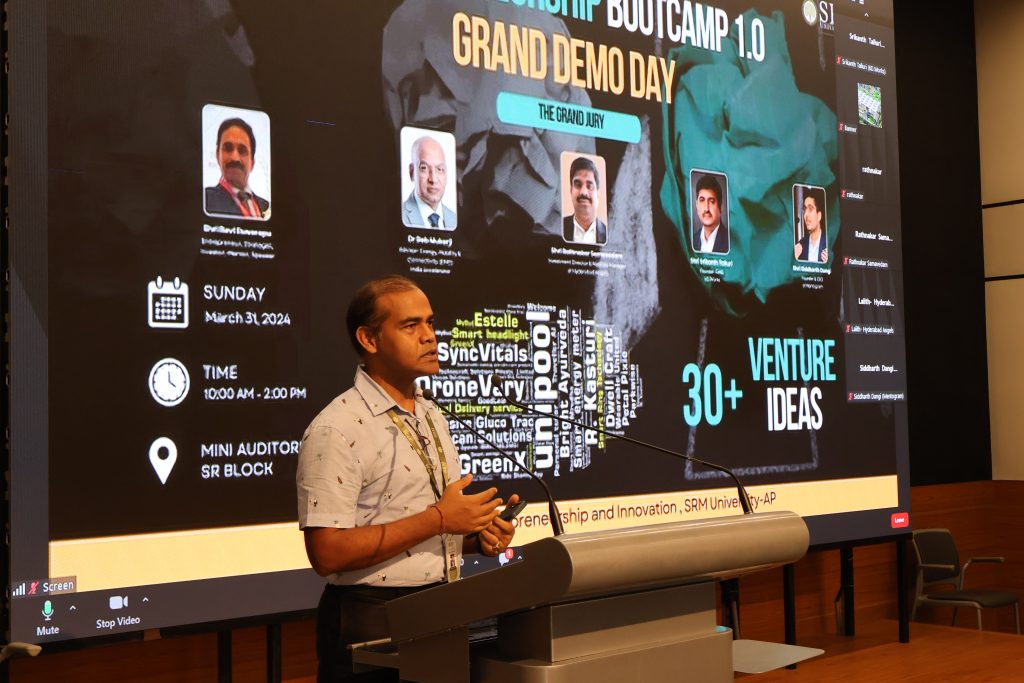
- Published in Departmental News, IDEA Events, IDEA NEWS, IDEA Workshop, News

